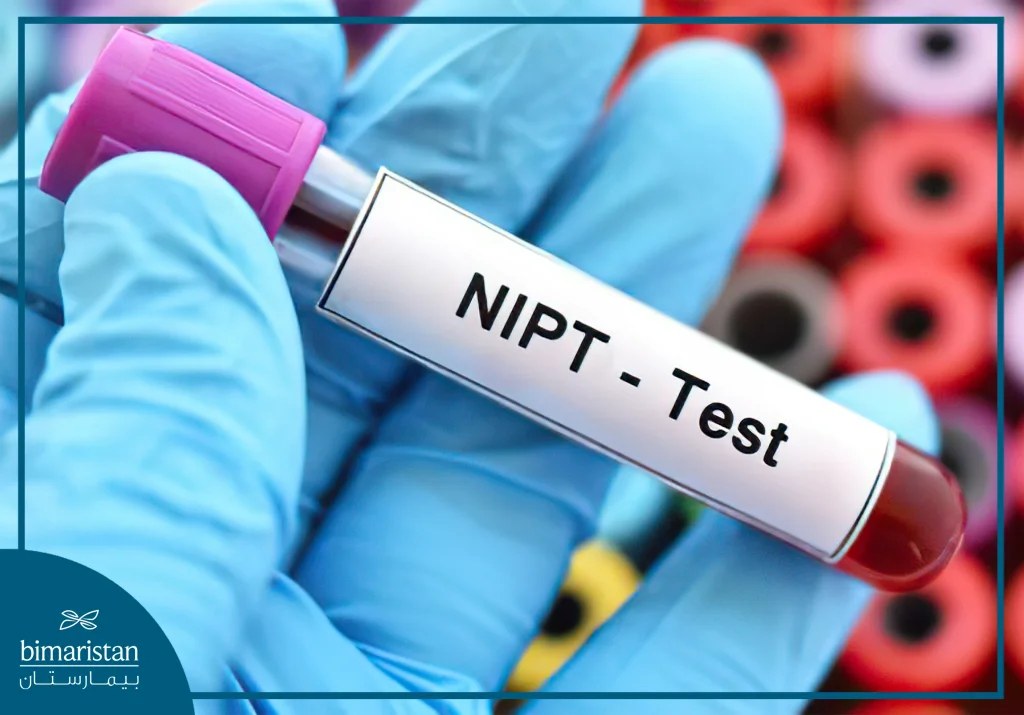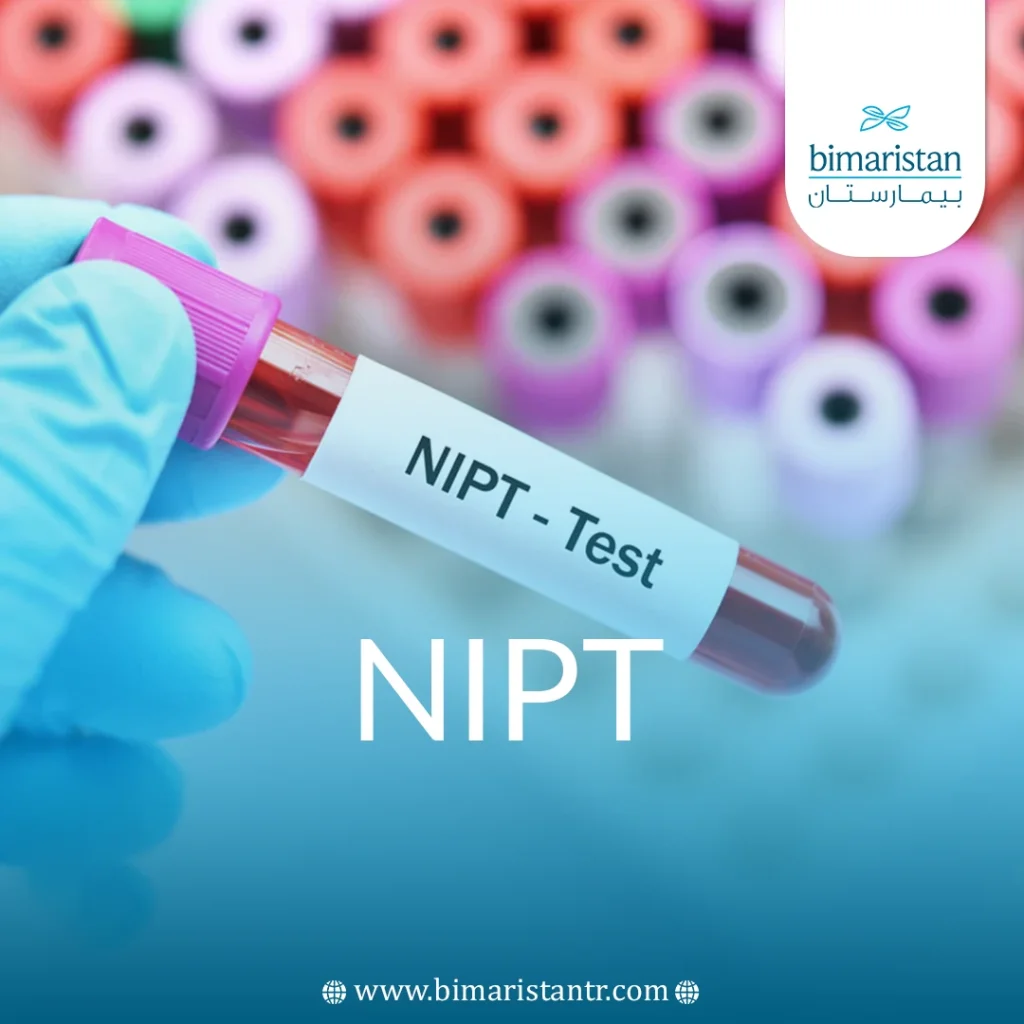Non-invasive prenatal testing (NIPT) is a revolutionary advance in prenatal screening. NIPT is a simple and highly accurate blood test.
NIPT helps diagnose common chromosomal abnormalities in the fetus as early as the 10th week of pregnancy for both singleton and twin pregnancies.
NIPT can also be combined with other advanced scientific services, such as storing the baby’s stem cells from the umbilical cord blood at birth.
What is NIPT, and how does it work?
Some of the baby’s DNA passes from the placenta into the bloodstream during pregnancy. A sample of the mother’s blood is taken, and this test examines the DNA to determine the number and condition of certain chromosomes in the fetus.
Using an advanced technology called “mass parallel sequencing,” millions of DNA fragments are analyzed for each sample, accurately counting the number of chromosomes present and determining whether there are extra or missing copies of these chromosomes in the baby.
Non-invasive prenatal screening is a revolutionary advance in prenatal screening that can study the fetus’s genetic material (DNA) by analyzing the mother’s blood.
In the past, studying fetal DNA required more invasive methods, such as amniocentesis or chorionic villus sampling, which are not without risks for mothers and their babies.
Non-invasive prenatal screening is a simple and highly accurate test that helps avoid deeply invasive techniques for detecting certain diseases before birth.
These non-invasive prenatal tests enable you to screen for the most common chromosomal abnormalities that can affect your baby’s future health using a simple blood test.
You can do this non-invasive test from the 10th week of pregnancy for both singleton and twin pregnancies.
Features of non-invasive prenatal testing
A single tube of blood is drawn.
- You can do it at ten weeks early in pregnancy (first trimester).
- It is 99% accurate in diagnosing trisomy 21, 18, and 13—Down syndrome, Edwards syndrome, and Patau syndrome.
- It has the highest success rates.
- Doctors will receive the results within 5-7 days.
Who is the non-invasive prenatal test for?
Science has developed tremendously nowadays, and noninvasive fetal DNA testing offers many benefits for diagnosing fetal chromosomal disorders. It is used to find important and accurate information about the health of your developing child in the first three months (i.e., week 10) of the fetus’s life, with little or no risk to the pregnancy. It is possible to perform this test in Turkey today.
You may consider this screening as an option if:
- You are 35 years or older at the time of delivery (32 years or older for twins)
- You have an abnormal or “positive” serum test
- If an ultrasound shows concerns or abnormalities in fetal growth and development
- It may be used for those with a personal or family history of genetic disorders (such as Down syndrome)
In addition, Australian and international medical associations recommend that all pregnant women, regardless of risk factors, have the opportunity to discuss and make choices about non-invasive prenatal testing and other screening and diagnostic tests available before birth.
Diseases that can be detected by non-invasive prenatal testing
Chromosomes usually come in pairs. Most people have 23 pairs of chromosomes, with one pair determining sex.
Men usually have an XY pair of sex chromosomes, and women usually have an XX pair of sex chromosomes.
Any increase or decrease in the number of chromosomes can lead to mental or physical disabilities with varying levels of severity.

Non-invasive prenatal tests look for fewer or more copies of chromosomes, which are often associated with these disabilities.
- The NIPT accurately detects many diseases, such as:
- An extra copy of chromosome 21 (Down syndrome)
- An extra copy of chromosome 18 (Edwards syndrome)
- An extra copy of chromosome 13 (Patau syndrome)
- Aneuploidy of the sex chromosome (change in number)
The NIPT 46 test expands to include testing all 23 pairs of chromosomes, such as:
- Chromosomes 1 to 22 (including 21, 18 and 13 tested by the previous test), to look for changes in number and missing or extra small parts of chromosomes.
- Testing for specific sex chromosome aneuploidy.
Your doctor may have some clinical observations that prompt him to order another test, the NIPT Plus test (Non-Invasive Prenatal Test Plus). In this test, he will search for the presence of very rare genetic syndromes resulting from the loss of a very small part of one of the chromosomes.
It should be noted that the NIPT Plus test cannot be performed on twins, and the detection of changes in the number of sex chromosomes is only available for singleton pregnancy (one fetus).
The non-invasive prenatal test can be performed when the woman is at least ten weeks pregnant, depending on the condition the doctor is looking for. Before the test, the woman undergoes an ultrasound examination to check the age and development of the fetus. She may also receive counseling to help her prepare for the test results.
You can also read about artificial insemination in Turkey on our website.
How is the woman informed about the non-invasive test results in Turkey?
Your test report will include one of two possible results for each of chromosomes 21, 18, 13, and the sex chromosomes. If your NIPT test is 46, you will also get a result for all other chromosomes:
- Low-risk result: means that the expected number of chromosomes were found.
- High-risk result: means that there are too many or too few copies of one of the chromosomes. A diagnostic test is recommended to confirm the result and should be discussed with your doctor.
NIPT Test Results
The non-invasive prenatal test detects chromosome conditions but does not diagnose them. The test cannot tell you for sure whether your baby has a chromosomal disorder or not.
Do not hesitate to contact us, your family’s hospital center in Turkey, to learn the meaning of the non-invasive prenatal test results and inquire about any problems women face during pregnancy and before birth.
If the test indicates that your baby is at risk for a chromosomal condition, your doctor may recommend further tests to confirm the diagnosis.
These tests may be more invasive and include:
- Amniocentesis: The fetus is surrounded by amniotic fluid, a water-like substance that contains fetal cells. Amniocentesis is a procedure in which a small amount of amniotic fluid (less than 1 ounce) is taken with a fine needle inserted into the uterus through the abdomen under ultrasound guidance. The fluid is then sent to a lab for analysis. This test can be done between weeks 14 and 20 of pregnancy. It cannot be done if a premature birth is suspected.
- Chorionic villus sampling: The chorionic villi are small parts of the placenta that are made up of the fertilized egg, so they usually have the same genes as the fetus. A small sample of chorionic villus cells is taken from the placenta to perform a chorionic villus sampling test, and it attaches to the wall of the uterus. There are two ways to take the cells: through the vagina and cervix or the abdomen. The chorionic villus sample is then sent to a lab where the cells are cultured in a special fluid and tested a few days later. This test can be performed between weeks 10 and 13 of the fetus’s age.
These tests and examinations help to identify the genetic disorder that the fetus may suffer from and are also used to test paternity, diagnose the fetus’s infection, and ensure lung maturity.
Ultimately, we find that the non-invasive prenatal test gives a great advantage over other invasive or surgical methods, as it detects 99% of chromosomal abnormalities in the fetus, so it is recommended to perform it before birth to know what the family will face with the newborn.
Sources:
